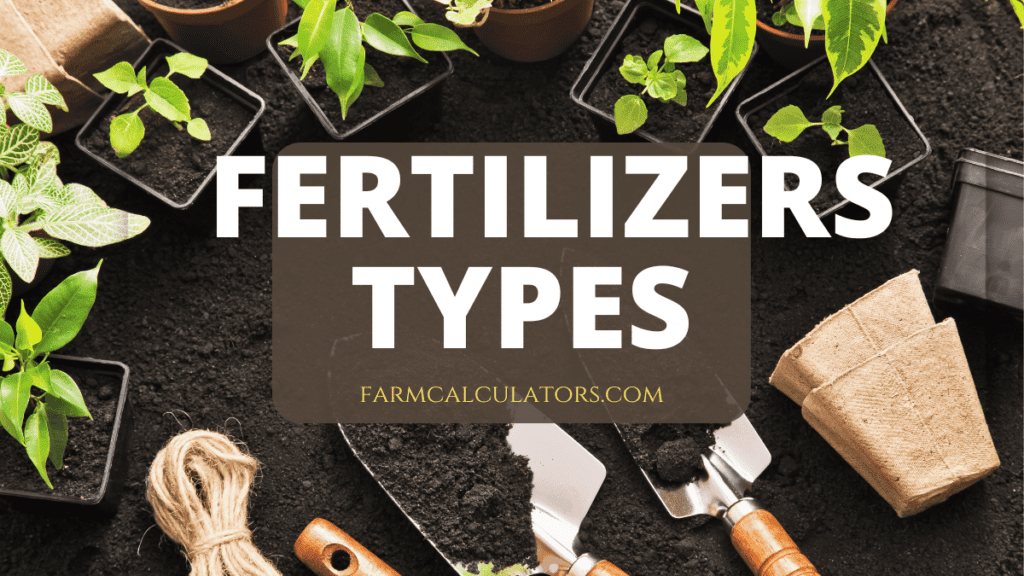
Knowledge of fertilizers type is very important for scientific agriculture. Plants need nutrients to grow, which they absorb from the soil via the plant’s root system. Fertilizers provide the major nutrients (nitrogen, phosphorus, potassium, and important secondary elements) that plants need. Unless the nutrients are replenished, the soil’s productive capacity declines with every harvest. The following types of fertilizers are required for the proper growth of plants, flowers, and fruits.
- Nitrate-based fertilizers
- Nitrogen with inhibitors fertilizers
- Phosphorous based fertilizers
- Potassium based fertilizers
- Calcium, magnesium, and sulphur based
- Micronutrient fertilizers
- Organics
- Other plant nutrition
Nitrogen fertilizers type
The most common fertilizers are Nitrate-based fertilizers are ammonium nitrate (AN) and calcium ammonium nitrate (CAN). Europe farmers use these as it suits their soils and climatic conditions. Other parts of the world, especially Asia, prefer urea and urea ammonium nitrate (UAN) aqueous solutions. Other straight nitrogen fertilizers include ammonium sulphate and ammonium sulphate nitrate, calcium nitrate, sodium nitrate, Chilean nitrate and anhydrous ammonia.
Nitrogen fertilizers type with inhibitors
Certain weather and soil conditions can lead to nitrogen immobilisation, denitrification, volatilization, or leaching, all reducing fertilizer efficiency. They include foliar, slow and controlled release fertilizers, as well as fertilizer additives such as urease and nitrification inhibitors.
Phosphorus fertilizers type
The most common phosphate fertilizers are single superphosphate (SSP), triple superphosphate (TSP), monoammonium phosphate (MAP), di-ammonium phosphate (DSP) and ammonium polyphosphate liquid.
Different fertilizer products have different release profiles and need different spreader settings for efficient application.
Potassium fertilizers type
Potassium-based fertilizers can be Potassium chloride (KCl), Potassium sulphate (K2SO4) or sulfate of potash (SOP), Potassium nitrate (KNO3), known as KN.
Calcium, magnesium, and sulphur Fertilizers type
Calcium (Ca), magnesium (Mg) and sulphur (S) are essential secondary plant nutrients. They are not usually applied as straight fertilizers but in combination with the primary nutrients N, P, and K.
Sulphur is often added to straight N fertilizers such as ammonium nitrate or urea. Other sulphur sources are single superphosphate (SSP), potassium sulphate (SOP) and potassium magnesium sulphate (Kainite), the latter also containing magnesium.
Kieserite is a magnesium sulfate mineral that is mined and also used as fertilizer in agriculture, mainly to correct magnesium deficiencies. Calcium is mainly applied as calcium nitrate, gypsum (calcium sulfate) or lime/dolomite (calcium carbonate), of which calcium nitrate is the only readily plant-available source of calcium.
Micronutrient fertilizers type
Micronutrient fertilizers supply iron, manganese, boron, zinc, and copper. These can be either inorganic or organic compounds, with the inorganic varieties further divided into water-soluble and non-soluble products.
Inhibitors That Slows Conversion to Nitrate
Nitrification inhibitors are chemical compounds that delay the nitrification of ammonium by suppressing the activity of nitrosomonas bacteria in the soil. The objective is to preserve the ammonium in its soil-stable form and slow its conversion to nitrate. This temporarily reduces the proportion of nitrate in the soil, and thus the potential for leaching losses into water or the formation of N2O gas in the atmosphere.
Organic fertilizers type
These days, the use of organic fertilizers has considerably gone up, because people are consuming organic foods. Organic fertilizers can be crop residues, animal manure, and slurries are the principal organic fertilizers. These types of organic fertilizers cover a wide range of nutrient sources with different physical properties and nutrient contents.
Other types of Plant Nutrition
A wide range of so-called fertilizing products can help farmers to adapt their fertilization practices to their environmental and farm conditions: organic fertilizer, organo-mineral fertilizer, mineral fertilizer, incl. inhibitors, liming material, growing media, plant biostimulants etc.